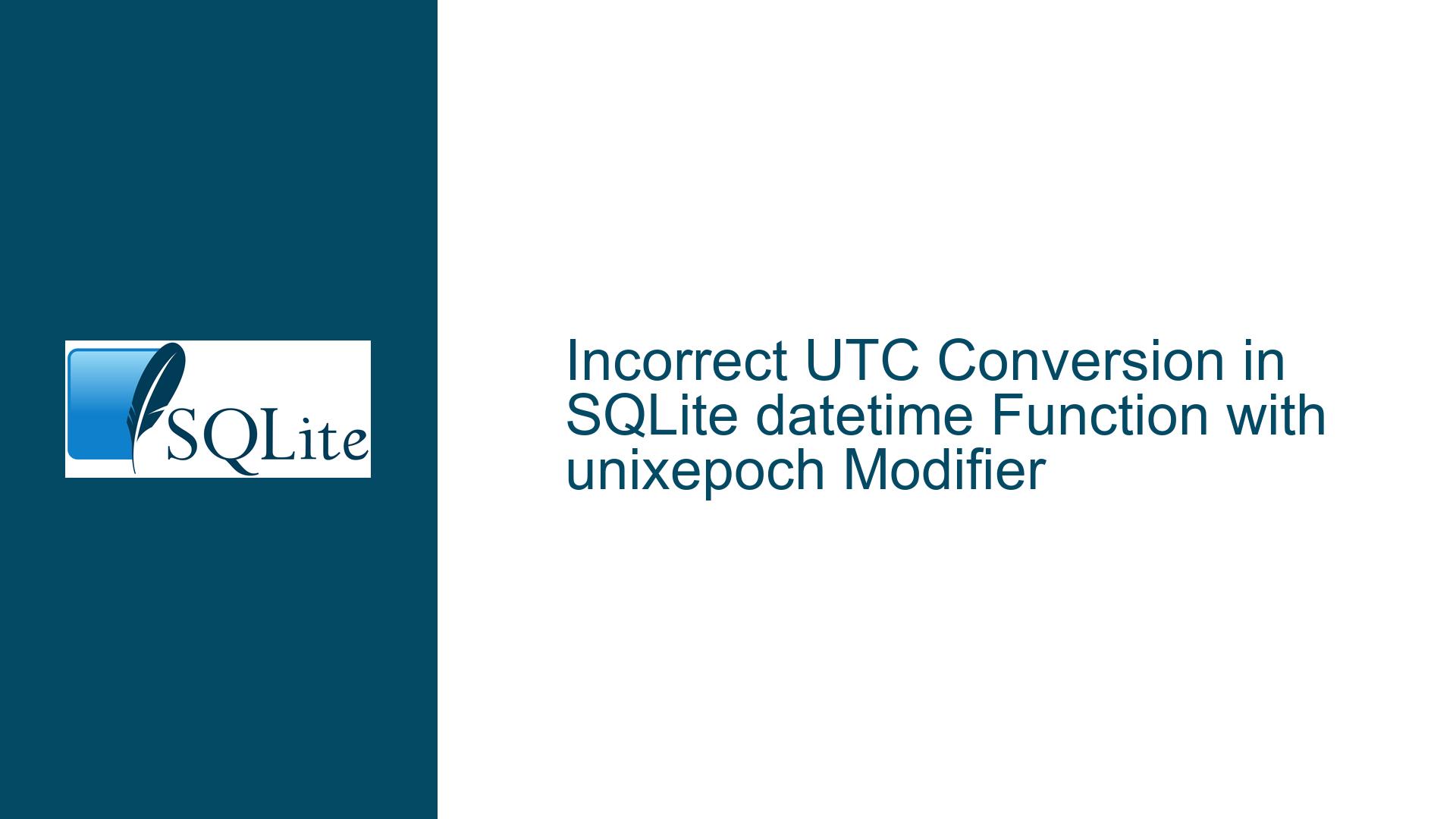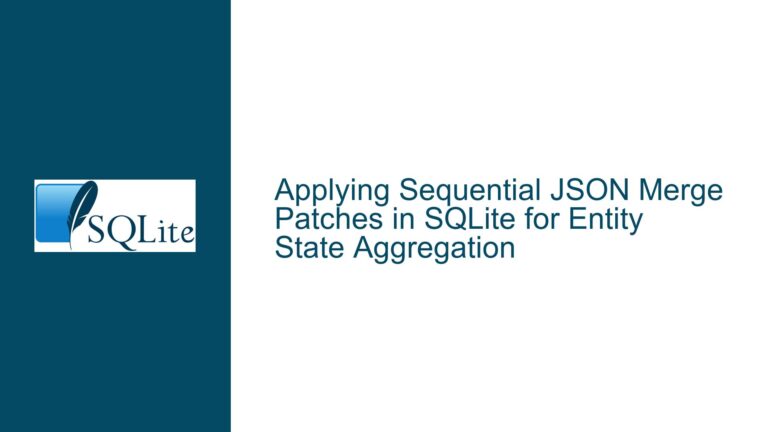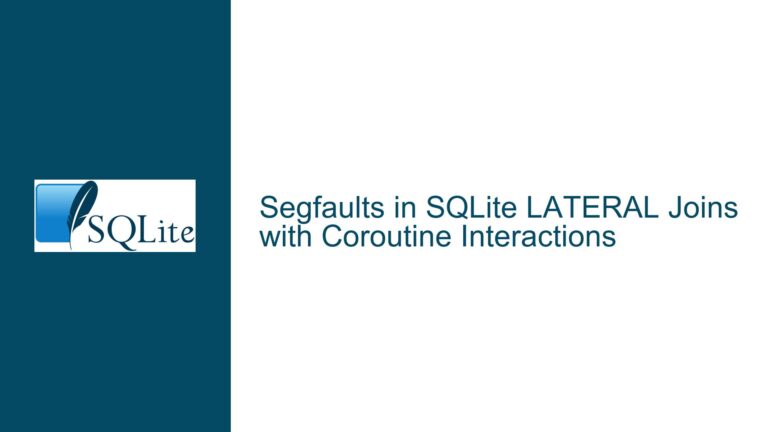Incorrect UTC Conversion in SQLite datetime Function with unixepoch Modifier
Unixepoch Timestamp Misinterpretation in UTC Conversion
The issue at hand revolves around the misinterpretation of Unix epoch timestamps when using the datetime function in SQLite with the unixepoch and utc modifiers. Specifically, the problem arises when a Unix epoch timestamp, which is inherently in UTC, is passed to the datetime function along with the utc modifier. The expected behavior is that the function should return the correct UTC datetime string corresponding to the given Unix epoch timestamp. However, the actual result is a datetime string that is shifted back by the local timezone offset, leading to an incorrect representation of the timestamp.
For example, when executing the query SELECT datetime(1607787371, 'unixepoch', 'utc');, the expected result is 2020-12-12 15:36:11, which corresponds to the UTC time for the given Unix epoch timestamp. However, the actual result is 2020-12-12 12:36:11, which is the UTC time minus the local timezone offset (e.g., Moscow timezone offset of +3 hours). This behavior is counterintuitive, especially since Unix epoch timestamps are universally understood to be in UTC.
The confusion stems from the interaction between the unixepoch and utc modifiers in the datetime function. The unixepoch modifier is used to interpret the given number as a Unix epoch timestamp, which is the number of seconds since 1970-01-01 00:00:00 UTC. The utc modifier, on the other hand, is designed to adjust a datetime string that is presumed to be in local time to UTC. When these two modifiers are used together, the utc modifier incorrectly assumes that the Unix epoch timestamp is in local time, leading to the observed time shift.
Misapplication of the utc Modifier on Unixepoch Timestamps
The root cause of this issue lies in the misapplication of the utc modifier when used in conjunction with the unixepoch modifier. The utc modifier is intended to adjust a datetime string that is in local time to UTC. However, when applied to a Unix epoch timestamp, which is already in UTC, the utc modifier erroneously attempts to convert the timestamp from local time to UTC, resulting in an incorrect datetime string.
The documentation for the utc modifier states that it assumes the time value to its left is in local time and adjusts it to UTC. This assumption is problematic when the time value is a Unix epoch timestamp, as these timestamps are always in UTC. The utc modifier, therefore, should not be applied to Unix epoch timestamps, as it leads to a double conversion: first from Unix epoch to local time, and then from local time back to UTC. This double conversion is what causes the observed time shift.
Furthermore, the documentation for the datetime function does not explicitly warn against using the utc modifier with Unix epoch timestamps. This lack of clarity can lead to confusion, as users may assume that the utc modifier is necessary to ensure that the output is in UTC. In reality, the unixepoch modifier alone is sufficient to correctly interpret the timestamp as UTC, and the utc modifier is redundant and incorrect in this context.
The issue is further compounded by the fact that the behavior of the utc modifier is undefined when applied to a time value that is not in local time. Since Unix epoch timestamps are not in local time, applying the utc modifier to them results in undefined behavior, which in this case manifests as an incorrect time shift. This undefined behavior is a critical flaw in the design of the datetime function, as it can lead to subtle and hard-to-diagnose errors in applications that rely on accurate datetime conversions.
Correct Usage of datetime Function with Unixepoch and UTC Modifiers
To resolve this issue, it is essential to understand the correct usage of the datetime function with the unixepoch and utc modifiers. The key insight is that the unixepoch modifier alone is sufficient to correctly interpret a Unix epoch timestamp as UTC, and the utc modifier should not be used in this context. The utc modifier is only necessary when dealing with datetime strings that are in local time and need to be converted to UTC.
When working with Unix epoch timestamps, the correct query to obtain the corresponding UTC datetime string is:
SELECT datetime(1607787371, 'unixepoch');
This query correctly interprets the Unix epoch timestamp 1607787371 as UTC and returns the expected result of 2020-12-12 15:36:11. The utc modifier is not needed and should be omitted, as it would otherwise lead to an incorrect time shift.
For scenarios where the datetime string is in local time and needs to be converted to UTC, the utc modifier can be used as follows:
SELECT datetime('2020-12-12 12:36:11', 'localtime', 'utc');
In this case, the localtime modifier is used to interpret the datetime string 2020-12-12 12:36:11 as local time, and the utc modifier is used to convert it to UTC. This usage is correct and will yield the expected result of 2020-12-12 15:36:11 for a local timezone offset of +3 hours.
To avoid confusion and ensure accurate datetime conversions, it is crucial to adhere to the following best practices:
Use the
unixepochmodifier alone for Unix epoch timestamps: When dealing with Unix epoch timestamps, always use theunixepochmodifier without theutcmodifier. This ensures that the timestamp is correctly interpreted as UTC.Use the
utcmodifier only for local time datetime strings: Theutcmodifier should only be used when converting datetime strings that are in local time to UTC. It should not be used with Unix epoch timestamps, as they are already in UTC.Avoid undefined behavior: Be aware of the undefined behavior that arises when the
utcmodifier is applied to time values that are not in local time. This includes Unix epoch timestamps, which are always in UTC.Refer to the documentation: Always refer to the SQLite documentation for the
datetimefunction and its modifiers to ensure correct usage. The documentation provides valuable insights into the behavior of these functions and can help prevent common pitfalls.
By following these best practices, developers can avoid the pitfalls associated with the incorrect use of the utc modifier and ensure that their datetime conversions are accurate and reliable. Additionally, it is recommended to thoroughly test datetime conversions in different timezone settings to verify that the results are as expected.
In conclusion, the issue of incorrect UTC conversion in the SQLite datetime function with the unixepoch modifier arises from the misapplication of the utc modifier. The utc modifier should not be used with Unix epoch timestamps, as they are already in UTC. By understanding the correct usage of the datetime function and its modifiers, developers can avoid this issue and ensure accurate datetime conversions in their applications.






